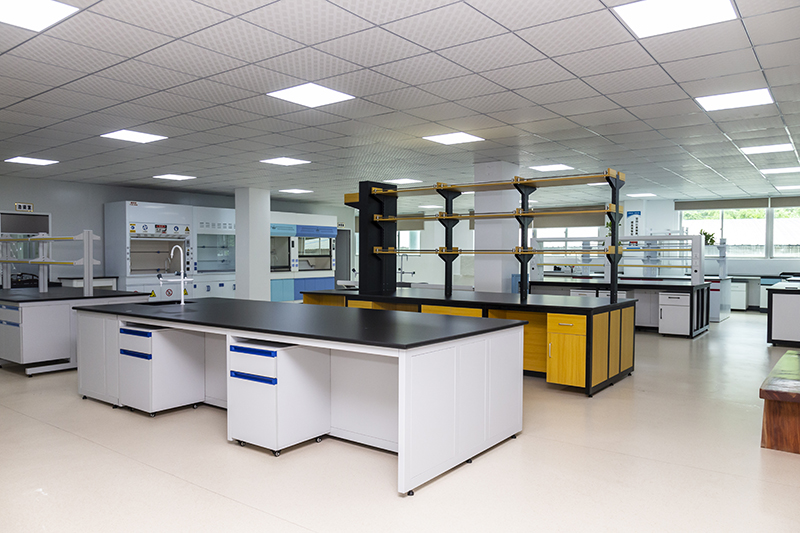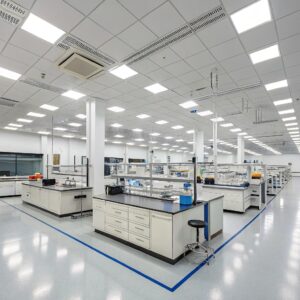Why Hospitals Need Lab Furniture But Not Common Furniture?
Hospital laboratories are specialized environments that require specific types of furniture to ensure safety, efficiency, and compliance with strict regulatory standards. Common furniture simply does not meet the rigorous demands of a lab setting.
Lab furniture is designed to withstand exposure to chemicals, biological agents, and other hazardous materials. It also supports the unique workflow of lab professionals, providing ergonomic solutions that help prevent injuries and fatigue.
Additionally, lab furniture must be easy to clean and sterilize to maintain a sterile environment crucial for accurate testing and patient safety.
What’s The Type Of Lab In Hospitals?
Hospitals host a variety of labs, each with specific needs:
Clinical Laboratories: These include hematology, microbiology, and pathology labs, where tests on patient samples are conducted.
Research Laboratories: These labs focus on medical research to develop new treatments and medical knowledge.
Pharmacy Laboratories: These labs are involved in the preparation and compounding of medications.
Radiology and Imaging Labs: Although not traditional “labs,” these areas require specialized furniture to support imaging equipment and provide patient care.
Emergency Response Labs: These labs handle urgent testing and analysis during medical emergencies.
What Type of Lab Furniture Do Hospitals Need?
Hospital lab furniture must be tailored to the specific needs of each type of lab. Essential types include:
Workbenches: Durable, chemicalresistant surfaces that provide ample workspace.
Storage Cabinets: Secure storage for chemicals, samples, and lab equipment.
Fume Hoods and Biosafety Cabinets: Provide ventilation and protection from hazardous substances.
Specialized Tables: Adjustable height tables, antivibration tables for sensitive equipment, and more.
Seating: Ergonomic chairs and stools designed for lab environments.
Sinks and Wash Stations: For hygiene and decontamination purposes.
Is Hospital Lab Furniture the Same as Other Types of Lab Furniture?
While there are similarities, hospital lab furniture often has additional requirements. For example, clinical labs demand furniture that meets medicalgrade standards for sterility and infection control.
Research labs might need more robust chemical resistance and specialized features for experimental setups. Thus, while some features overlap, hospital lab furniture often has higher standards and more specialized functionalities.
On What Condition Should Hospitals Buy Lab Furniture?
Hospitals should invest in new lab furniture under several conditions:
Upgrading or Expanding Lab Facilities: When expanding existing labs or building new ones.
Compliance Updates: To meet updated regulatory requirements and safety standards.
Wear and Tear: Replacing old, damaged, or wornout furniture that could compromise safety or efficiency.
Technological Advancements: When new technologies or methodologies require specialized furniture.
Improving Ergonomics and Efficiency: To enhance the working conditions for lab personnel, reducing injury risks and improving productivity.
Three Essential Points Hospital Purchasers Should Consider
Compliance and Safety Standards
Ensure all lab furniture meets local and international safety standards. This includes chemical resistance, fire safety, and ergonomic design. Check for certifications and compliance with healthcare regulations.
Durability and Quality
Invest in high-quality furniture that offers long-term durability. Consider materials like stainless steel or high-density polyethylene, which are resistant to corrosion and wear. Quality furniture reduces replacement costs and downtime.
Customization and Flexibility
Choose furniture that can be customized to fit specific lab requirements. Modular designs allow for flexibility and scalability, accommodating future changes in lab processes or expansions. Customizable furniture ensures that the lab setup can evolve with the hospital’s needs.
By following this guide, hospital purchasers can make informed decisions that enhance the functionality, safety, and efficiency of their laboratory environments, ensuring that they meet the unique demands of hospital operations.
More information about how to choose laboratory furniture, please refer to this article:
The Ultimate Guide To Choosing The Best Lab Furniture For Your Needs




